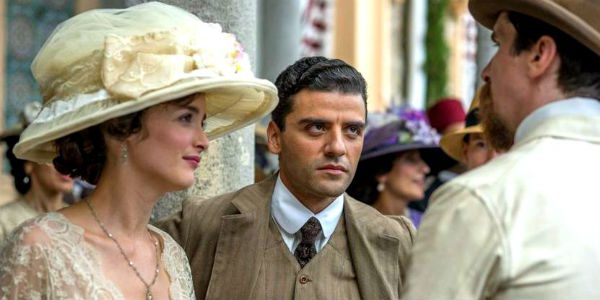 The story of the Armenian Genocide in Turkey during World War I — which the Turks vehemently deny — deserves a movie, if not several movies. It just deserves better than “The Promise,” releasing today, Friday, April 21.
The story of the Armenian Genocide in Turkey during World War I — which the Turks vehemently deny — deserves a movie, if not several movies. It just deserves better than “The Promise,” releasing today, Friday, April 21.
Boasting a reported $100M budget, “The Promise” is handsomely mounted, and the largely Spanish and Portuguese locations are gorgeous, but way too much time is spent traipsing up and down an endless parade of hills, paths and byways. This isn’t the Donner Party or an Antarctic expedition – the story isn’t in the travel, it’s in what happens when you eventually, at length, get there.
Reminiscent of 2001’s “Pearl Harbor,” “The Promise” embeds a fictional trio of only mildly interesting characters, along with a tepid and thoroughly illicit romance, into a film about a huge historic event. And as in “Pearl Harbor,” it’s an unnecessary distraction from the real thing.
Charlotte Le Bon plays Ana, a Paris-raised Armenian Christian who’s the lover of Chris Myers (Christian Bale), an American war journalist. In Constantinople, now Istanbul, they meet Mikael (Oscar Isaac), an Armenian medical student from a small town in Turkey.
Even though Ana is involved with Chris, and Mikael is betrothed to a girl back home (providing a dowry which is bankrolling his studies), the two have an affair. Evidently neither takes Christian morality too seriously, especially since they flirt while sitting in a cathedral listening to a monk sing sacred music.
So, in an entirely unforced error, Christianity takes a hit.
While the brutal excesses of the Ottoman Turks are unflinchingly portrayed, their Islamic faith is noticeably downplayed. In a further attempt at balance, there’s also a fourth fictional character, a young Muslim Turk, a friend of Mikael from medical school, who winds up being heroic.
All of this would be fine, and may be historically accurate in terms of Constantinople in that era, but thrown in at the same time the Christian characters are seemingly oblivious of sexual morality, it comes off as unfortunate and off-kilter.
There are, though, Christian missionaries portrayed who are heroically attempting to save orphans from slaughter, and some Turkish officials who risk their own safety to help (one hopes there were real ones, as well).
Strangely. none of the villainous Turkish military officers portrayed, as bad as they may be, look half as evil as the Turkish Bey, played by Miguel Ferrer, in “Lawrence of Arabia.” Even though the truth of the sexual-assault incident shown in that film is disputed, Ferrer knew how to embody evil with only the most subtle hints. Here, it’s almost cartoonish.
Ultimately, the whole shebang wraps up with a scene that plays like a weird homage to “Titanic,” of all things.
But, underneath the overwrought, overly long fictional drama is the powerful and often-overlooked story of the Armenian Genocide. So, despite its shortcomings, I encourage you to get out and see “The Promise,” for educational purposes, if nothing else.
Image: Courtesy Open Road Films
Don’t miss a thing: head over to my other home, as Social Media Manager at Family Theater Productions; and check out FTP’s Faith & Family Media Blog.














